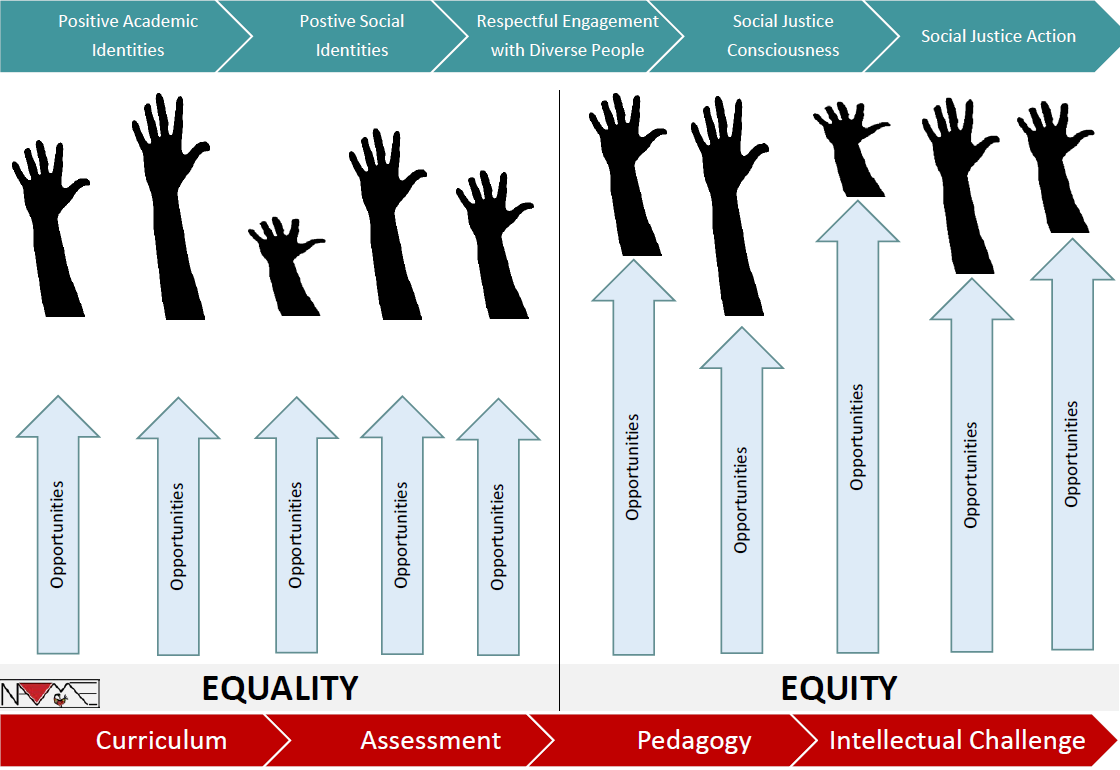
image via National Association for Multicultural Education
Is there empirical research demonstrating the efficacy of equity audits?
This question was posed to me a couple of months ago and being a bit of a research nerd, I decided to see what was out there in the realms of published studies that might confirm or refute the efficacy of conducting an equity audit.
First, let’s define terms. An equity audit is a process that examines various aspects of a school district to determine whether the district is providing an equitable education for all of its students, regardless of race, income, special education status, neighborhood, gender, sexual orientation, or religious affiliation. The precise aspects an audit examines may vary depending on who is conducting the review. There are a lot of potential metrics that equity audits can look at: policies, curriculum, resources, achievement and discipline data, staffing demographics, funding and budget determination, demographics by school, and school climate. When CMSi does equity audits, we also look at classroom delivery, student work artifacts, and where possible, expectations by school and alignment to external tests. Sometimes we are able to drill down to differences in rigor between special populations (SPED, ELL, Bilingual, FRL), depending on available data. One of the most critical aspects CMSi looks at is vision — what does the district want equity to look like for its students? Measuring success is impossible if you aren’t sure where you want to end up. Every piece of data examined in an equity audit should be evaluated against research that clarifies best practice. Once all the data are analyzed, the audit should offer concrete, measurable recommendations for improving equity in the district.
So how effective is all this data in moving districts toward more equity for their students? Is there hard data that confirms equity audits work?
Not exactly. And here’s why:
An equity audit works in the same way a financial audit does. Someone comes in, reviews all your accounts, your budgeting, your investments, and your spending habits, and makes recommendations to you on what you need to do to improve your bottom line. Let’s say, for example, your financial audit recommends you stop gambling or you’ll go bankrupt. And let’s say, for the sake of argument, that you ignore this recommendation, continue playing high-stakes online poker, and go bankrupt in 11 months. Can we then say that the financial audit was ineffective at improving your finances? Of course not; the efficacy of the audit lies in how faithfully you implemented the recommendations, not in the audit itself. We could quibble here and cite stuff that maybe the audit didn’t address. If the audit knew about your gambling habit and failed to address it in the recommendations, then that would be a failure of the audit process, so the quality of the analyses and recommendations is important. But assuming data are generally accurate and fully addressed in quality recommendations, it’s what we do with them that determines their efficacy.
While there’s no empirical research demonstrating the efficacy of equity audits in and of themselves, there is research demonstrating the effectiveness of implementing the recommendations from equity audits. I’m covering that in Part II.
If you are interested in an Equity Audit for your district or school, Contact Us! We would love to help you improve equity and learning for your students.
